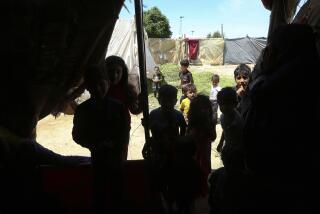Some Iraqis Seek Respite From Violence
- Share via
CAIRO — Reem Jawad can’t take her young daughters to see Iraq’s “great and famous Tigris and Euphrates” rivers -- it’s too dangerous, she believes.
So the 34-year-old Iraqi brought her mother and two girls for a vacation in Egypt, to see the Nile -- and to get a brief respite from the violence and psychological stress of the war back home.
Jawad was sad and frustrated when her 5-year-old daughter asked, “Why don’t we have a river like the Nile in Baghdad?” She was even sadder when it was time to return home and her 3-year-old yelled that she would not go.
Going back, Jawad said, sighing, is “an inevitable evil.”
Iraq’s violence, tough living conditions and uncertain future have caused many Iraqis -- estimated at hundreds of thousands -- to flee their country for refuge in Jordan, Syria and Egypt.
Others who cannot or will not leave take their holidays in places such as Egypt, if they have the money.
Jawad laments that the violence forced her, her husband and two children to leave their home in Amiriya, a bloody western neighborhood of Baghdad, and move in with her parents in a safer district, Kadhimiya.
“Yes, we are Iraqis who live in Iraq. But we feel like strangers -- as if it is not our home,” she said. “It’s killing me that I cannot practice my private life with my husband and girls.”
During the two-week visit to Egypt with a group of 30 Iraqi tourists, she almost cried when her girls, cruising with a boat party, asked her why Baghdad had no river like Cairo’s Nile.
In fact, the Tigris flows right through the middle of Baghdad, but river traffic and even fishing are discouraged because of the lack of security.
It is not just freedom from violence but also freedom from new societal restrictions that leads some Iraqis to take breaks elsewhere in the region.
Twice a week, Niran Hashim has a tea and talk session in her apartment in Amman, Jordan, gathering friends who are mostly Sunni Arab women from Iraq living in exile.
“Biscuits [cookies] and tea -- it does not cost a lot,” the 37-year-old Iraqi woman said. “Gossip is women’s life, and I am glad to get my life back again.”
Hashim and her friends also gather at Amman’s malls -- not necessarily to shop but to enjoy what they have lost back home: “Security and freedom,” she said.
“There are no such malls in Baghdad, and even if there were, we are forbidden to go to such markets because they will be easy targets for terrorists,” she said.
On a recent day in Cairo, Iraqi women and men were dancing and drinking freely on a boat sailing on the Nile, watching a belly dancer perform.
That would be inconceivable in public in Iraq, not just because of the violence, but because women are often harassed by Islamic religious militias unless they wear a veil and stay away from men.
“I can smoke in the streets here without being intercepted by gunmen,” said Munira Ahmad, 63, a retired Iraqi teacher who watched the belly dancer.
Ahmad said she disagreed philosophically with the veil, but she wore one back home to protect herself from harassment from the armed religious militiamen.
“Here I feel I am myself, because I can do anything I want,” she said, putting on a stylish hat that left locks of her dyed-blond hair flowing loose. “But back in Baghdad I have to wear the veil to keep the militants’ eyes away from me.”
Her 25-year-old son, Omar Salam, an engineer, had his first date on the trip -- after meeting a Polish girl of the same age in a hotel bar.
A newly married couple, Marwan Khaled and his wife, Dhuha, came to spend their honeymoon in Cairo. Khaled, 29, who works as a computer technician, said he enjoyed the freedom of showing his love to his new wife, and taking her to parties where men and women gathered to dance and drink.
Putting his arm on her shoulder as they sat on the boat, he said, “Here I feel free to hug and kiss my wife in public. I can never do this in Baghdad.”
More to Read
Sign up for Essential California
The most important California stories and recommendations in your inbox every morning.
You may occasionally receive promotional content from the Los Angeles Times.












